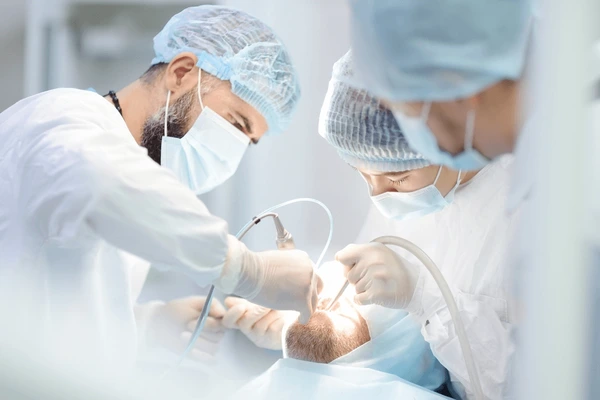
Emergency dental care in Geneva: what you need to know
Oral health isn't always something you can plan for, and sometimes a dental emergency happens without warning. In Geneva, finding a dentist who can quickly deal with dental pain or a dental accident can be a real game-changer. Between dental practices, specialized centers and on-call dentists, there are reliable solutions for accessing fast, effective dental care, depending on the severity or type of problem encountered. Let us help you understand how dental emergencies work in Geneva, and the different options available when a critical situation arises.
What is a dental emergency?
The term "dental emergency" covers a number of situations requiring rapid intervention. It's not always easy to distinguish between a tolerable discomfort and a real emergency. However, ignoring certain symptoms can lead to serious complications, particularly in the case of a dental infection or abscess.
The sudden onset of intense dental pain, the loss of a crown, a broken tooth following an impact or rapidly worsening swelling should raise the alarm. These are signs that prompt professional advice is strongly recommended. Prompt attention plays a major role in the prognosis of treatment, and avoids many inconveniences later on.
- Intense or persistent pain
- Dental trauma or broken tooth
- Sudden swelling (dental abscess)
- Bleeding difficult to control after extraction
- Displaced tooth impact
The main types of dental emergencies
A dental emergency can have multiple causes. Each type requires a specific response, in both adults and children. In Geneva, dental practices and clinics offer different protocols, depending on the diagnosis made during the first visit.
It's important to recognize each situation so you can adapt your response to a dental accident or acute pain. This ensures prompt dental care and avoids unnecessary complications.
Dental trauma and broken teeth: how to react?
Dental trauma caused by a fall, a blow or a sports accident can result in a broken, displaced or even knocked-out tooth. In such cases, it's best to recover the tooth fragment if possible, preserve it in milk and consult a dental practice as soon as possible. Reacting quickly can sometimes enable the tooth to be replaced or limit the after-effects.
Simple measures taken in the first few minutes can reduce the consequences of a dental accident. Dental emergency teams are often equipped to respond effectively to this type of situation.
Dental abscesses and infections: recognizing the dangers
A dental abscess is an acute infection of the gum or root of a tooth, manifested by painful swelling, fever and sometimes pus discharge. Such a situation should never be overlooked, as the infection can progress to sensitive areas such as the sinuses, or cause general damage.
Prompt dental care is aimed at draining the abscess, relieving the pain and then eliminating the cause of the infection with appropriate treatment and, if necessary, antibiotic therapy. Waiting to consult a specialist can expose you to serious risks to your overall health.
How do I find an on-call dentist in Geneva?
Stumbling upon a dental emergency on a Sunday, during a public holiday or outside normal working hours can seem complicated. Fortunately, in Geneva, an on-call dentist service takes care of patients every day of the year, including overnight.
There are several ways of locating an available practitioner: by telephone, by consulting the websites of professional associations or by displaying a notice at the entrance to the dental surgery. These systems ensure continuous access to emergency dental care, guaranteeing patient safety and comfort.
- Regional telephone services
- Display in pharmacies and health centers
- Consultation of official platforms

What to expect in a dental emergency
An emergency dentist's scope of action ranges from immediate symptomatic treatment to complete management of the problem. Once on site, the patient is usually given a thorough examination to tailor treatment to the precise nature of the problem.
Each dental practice follows a common framework to secure, stabilize and then develop a lasting solution: analgesic treatment, drainage or minor surgery, temporary or permanent repair depending on the context. The aim is to provide rapid relief while preserving long-term oral health.
| Type of emergency | Immediate care |
| Severe dental pain | Pain medication, etiological research |
| Dental abscess | Drain abscess, prescribe antibiotics |
| Broken or expelled tooth | Restraint, repositioning, repair |
| Dental infection | Cleaning, antiseptic treatment |
Preventing and anticipating dental emergencies
Prevention is better than cure, especially when it comes to dental health. Certain habits, accessible to all, considerably reduce the risk of encountering a dental emergency. A balanced diet, careful and regular brushing, and frequent visits to the dentist are all essential.
Sportsmen and women should use mouthguards during intense training sessions. For children, teaching strict hygiene from an early age is vital to avoid tooth decay and dental fragility. Dental clinics often offer personalized check-ups to detect any weak points at an early stage.
- Brush at least every morning and evening
- Choose the right fluoride products
- Regular check-ups with your dentist
- Eat a varied diet, low in fast sugars
- Use protection during high-risk sports activities
Frequently asked questions about dental emergencies in Geneva
What's the difference between an on-call dentist and a dental emergency center?
An on-call dentist is available on an ad hoc basis, often during nights, weekends or public holidays, while a dental emergency center brings together several specialists and offers equipment to treat all types of complex situations.
- The on-call dentist works alone or in a small group over a limited period of time.
- The emergency center has a full range of technical equipment
- Some centers are open all day, even without an appointment
How long should I wait to consult a dentist after a dental accident?
It is advisable to seek medical attention immediately, ideally within an hour of the impact, especially if the tooth has been displaced, partially loosened or completely expelled. The faster the intervention, the better the chances of recovery.
- Keep tooth or fragment clean, in milk
- Touch only the coronal (white) part, avoid the root.
- Visit a dental practice or clinic as soon as possible
How much does a dental emergency cost?
Fees vary according to the complexity of the rapid dental care required, but an initial emergency consultation usually includes examination, advice and sometimes the application of a dressing or prescription of painkillers.
- Some insurance companies provide partial coverage
- Request a detailed quotation in advance
Discover also the Centre Dentaire Lancy and the Centre Dentaire Champel





